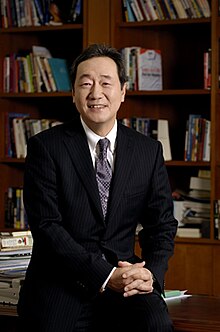Chang Dae-whan (also known as Chang Dae-Hwan, born 21 March 1952) is a South Korean businessman.[1] He is best known as the president of the Maeil Business Newspaper, South Korea's main business daily.[2] He is the founder of the World Knowledge Forum. The World Knowledge Forum is the largest forum of its kind in Asia. He also served a brief stint as South Korea's acting prime minister in August 2002 under president Kim Dae-jung, but the National Assembly voted not to confirm him.[3]
Chang Dae-whan | |
|---|---|
| 장대환 張大煥 | |
 | |
| Acting Prime Minister of South Korea | |
| In office 9 August 2002 – 10 September 2002 | |
| President | Kim Dae-jung |
| Preceded by | Chang Sang (acting) |
| Succeeded by | Kim Suk-soo |
| Personal details | |
| Born | 21 March 1952 |
| Political party | Independent |
| Children | 2 |
| Education | University of Rochester (BA) George Washington University (MA) New York University (MA, PhD) |
| Occupation | Businessman President of the Maeil Business Newspaper |
Education and career
editChang obtained a bachelor's degree in politics at the University of Rochester in 1974. He also received a diploma for the Study of EC (European Community) in Belgium in June 1975, and went on to do an M.A in 1976. in international affairs at George Washington University's Elliott School of International Affairs.[4] Afterwards, Chang received his M.A. and Ph.D. in economics and management from New York University, where he wrote his 1987 doctoral dissertation on South Korean construction firms in the Middle East.[1][5] He serves as the president of the South Korean branch of the NYU alumni association.[6]
Chang started his newspaper career as a manager of planning department at Maeil Business Newspaper on 1 January 1986. He then rose to the position of director, managing director, and executive director successively, finally becoming the president and publisher in 1988.[citation needed]
Chang is a Commissioner for the Global Commission on Internet Governance.[7]
As prime minister
editChang was named as South Korea's acting PM on 9 August 2002, after the National Assembly declined to confirm his predecessor Chang Sang. The nomination was a surprise to fellow top-level civil servants in their 60s, as Chang was just 50 years old at the time, and had no experience in government.[8] If appointed, he would have been the wealthiest member of the cabinet, with ₩5.6 billion in family assets, according to his self-report.[9] However, during his confirmation hearings, Grand National Party (GNP) members including Hong Joon-pyo and Ahn Kyung-ryul expressed their opposition.[10][11] Chang himself also acknowledged in a press conference that he had falsely registered himself as living in Seoul's Gangnam-gu to enroll his son in a better school.[10] In the end he was rejected by a vote of 151-112.[3]
Personal life
editHe was married and has two children.[12]
References
edit- ^ a b "장대환", Chosun Ilbo, retrieved 2010-07-09
- ^ Quinn, Stephen (2002), Knowledge management in the digital newsroom, Focal Press, pp. 173–174, ISBN 978-0-240-51677-6
- ^ a b "Second Recent Choice for Premier Rejected", Los Angeles Times, 2002-08-29, retrieved 2010-07-09
- ^ Irwin, Jame (8 June 2015). "Dae-Whan Chang Receives GW's Alumni Achievement Award". gwtoday.gwu.edu. Retrieved 18 August 2024.
- ^ Chang, Tae-hwan (1987), Performance of the Korea-based construction firms in the Middle East, Ph.D. dissertation, New York University, OCLC 26335012; see also Koreans in the Arab world
- ^ "강만수 특보 자랑스런 NYU동문상 수상 [Gang Man-su receives NYU alumni prize]", JoongAng Ilbo, 2009-12-16, retrieved 2010-07-09
- ^ "Global Commission on Internet Governance (2014–2016)". 20 January 2014.
- ^ Kim, Min-bai (2002-08-09), "Chang Dae-hwan Named as Acting PM", Chosun Ilbo, retrieved 2010-07-09
- ^ "PM-Designate's Private Assets Amount to W5.6 Billion", Chosun Ilbo, 2002-08-14, retrieved 2010-07-09
- ^ a b Cho, Hee-chun (2002-08-23), "PMs Confirmation Hearing Hits Problems", Chosun Ilbo, retrieved 2010-07-09
- ^ Kim, Chang-kyun (2002-08-27), "Confirmation Vote Set for Wednesday", Chosun Ilbo, retrieved 2010-07-09
- ^ The International Who's Who 2004. Psychology Press. 2003. p. 299. ISBN 9781857432176.